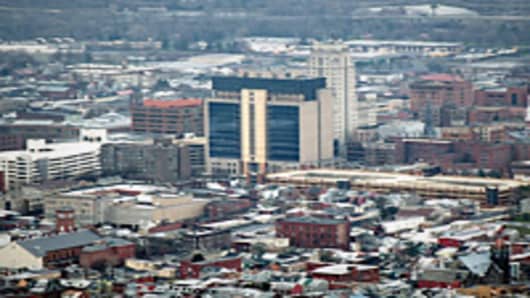Reading, PA—The scene outside Carpenter Technologies has been repeated once or twice a month for about the last two years. Eighteen men and women receiving a full factory tour as part of their official transition from temporary employee to full-time staff.
It's not just a good thing for each of the individuals. It's also a boost to a struggling city. Reading, Pennsylvania has an unemployment rate of 12 percent, and that's actually down from 13.5 percent.
Carpenter has added more than 350 jobs here since last summer, and it's been an injection of life into a city with a dying manufacturing base.
"You look at housing, you look at the amount of money that's spent on entertainment, on restaurants, and the fact that those folks are here and they're getting good wages and they're spending it locally in more cases than not," said Reading Mayor Thomas McMahon. "That makes a really big impact and it's something that helps all of us."
Carpenter makes specialty metals that go into a wide range of products, including oil-drilling equipment, medical devices and airplanes. The $2 billion company emerged from the "Great Recession" with strong earnings power, and just this week, it hit a new high of $53.23.
Beyond the new hires, the company hired back all workers it laid off three years ago and recently announced that the Reading facility will be expanded. That means new jobs to build the addition, and new jobs to service it.
"We were worried. We were scared," said Phyllis Logan, a 30-year Carpenter veteran, who actually took a voluntary furlough to ensure young workers did not lose their jobs. Now, she's back on the job. "You would come in and see the orders diminish, and we were just not sure. But then, business started picking up.
"When they put the information out there that they were hiring, it was exciting. We knew that we were on our way."
However, Reading is a long way from being on its way to prosperity. It's a lot like many American mid-sized cities: A former manufacturing hub that has seen jobs go away as companies have moved, either overseas or closer to customers.
Some of those companies will never return, but now, the city's Mayor says, the some 400,000 people in the area need to make sure they have the right skills to match the jobs that are created.
"There are a couple of areas that our cities are looking at right now, not only to attract high tech businesses, but also to make sure that we've got the quality workforce that's trained and educated and will be able to step in and take those kind of jobs when we actively recruit them," Mayor Thomas McMahon said.
Within the group of people who went on furlough, there are examples of the excess that helped create huge consumer debt problems ... and the lessons learned.
"I am getting back on my feet again," said Seth Thomason, who was let go three years ago and was working for his uncle's landscaping company when he received the call to come back to work. If he had not come back, at 19-years old, he would have been bankrupt.
"When I first started here, I was getting good pay for my age, and I went out and bought a new truck, motorcycle. Then, I got laid off and started getting behind on my finances," said Thomason, who said he learned a huge lesson and feels lucky for the second chance. "Once I came back, I started getting on my feet again.
"And just now, two years later, I've started to get back to where I was."
Now, he has a retirement plan, and he has opened a Roth IRA. Meanwhile, a lot of his friends who have four-year degrees are still looking for work.
"They all graduated last week, and they're still cutting grass," he said. "I know there's a lot of people that are unemployed and just looking to do anything, pretty much ... any way they can get money."
CNBC also spoke with Nate Romig, who graduated from Albright College with a degree in business marketing and history. It took him a matter of days after graduation to realize that he wasn't going to get a job locally in either field. Now, he's working the production line at Carpenter.
"I would think that I would have found a job, but something I would like doing? Probably not," he said. "And something that's not paying as well? Probably not."
Romig looks forward to getting off the line and onto a management track. But for now, he's just happy to be able to have a job in his hometown of Reading, Pennsylvania.



